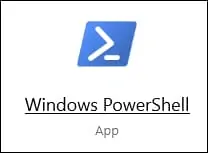Would you like to learn how to list all group policy objects in the domain using the command line? This tutorial will show you how to use the command line to list all GPOs in Active Directory.
• Windows 2012 R2
• Windows 2016
• Windows 2019
• Windows 2022
• Windows 10
• Windows 11
Equipment list
Here you can find the list of equipment used to create this tutorial.
This link will also show the software list used to create this tutorial.
Related tutorial - PowerShell
On this page, we offer quick access to a list of tutorials related to PowerShell.
Powershell - List all Group policy objects
Start a Powershell command-line.

List all GPO names.
Here is the command output:
List all group policy object names and IDs.
Here is the command output:
Translate the GUID to the GPO name.
Here is the command output:
Translate the GPO name to GUID.
Here is the command output:
List all GPO links.
Here is the command output:
List all links of a specific GPO.
List all GPO permissions.
Here is the command output:
List permissions of a specific GPO.
List all group policy objects using LDAP.
Here is the command output:
Some commands require the installation of the Powershell module for Active Directory management.
Congratulations! You are able to list group policy objects using Powershell.
